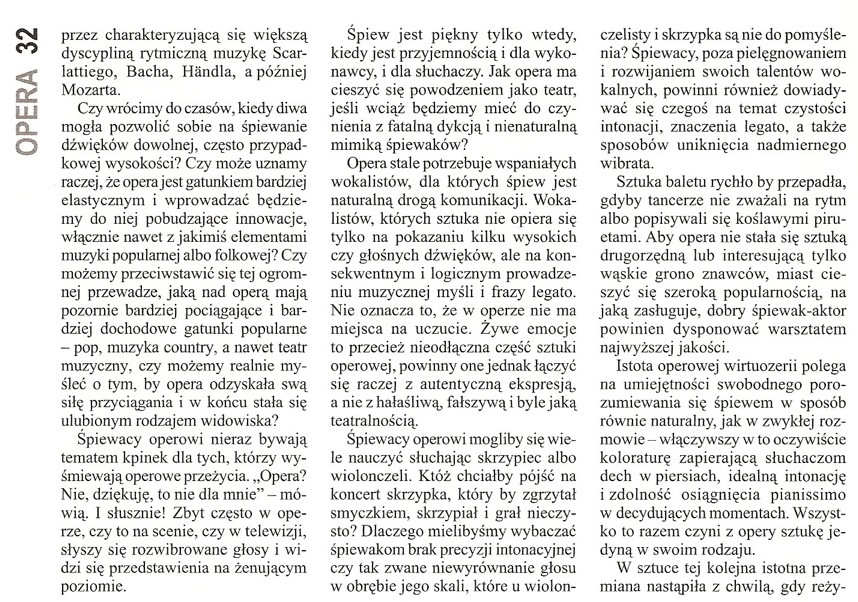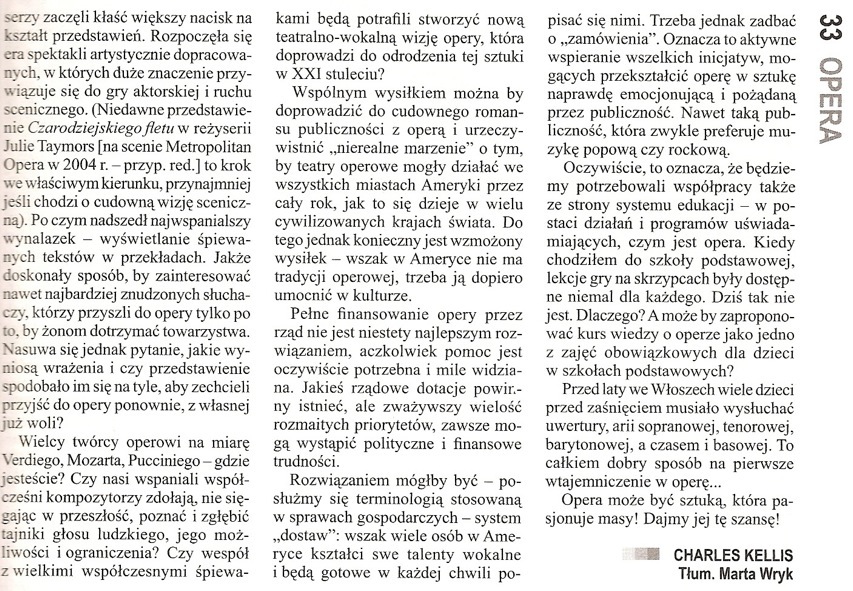CHARLES KELLIS


TWOJA MUZA (August - September ) 2012/ English



LA TRAVIATA
by Charles Kellis
Giuseppe Verdi had an ingenious capacity to weave words and their naked significance into an amazing pattern of operatic intelligibility. He, more than any other composer, except for Mozart, had the unique ability to make an uncanny infusion of the text consistent with It’s musical significance. Provided that the singer thoroughly understands the meaning of the words and the overall drama, Verdi’s operas almost act themselves. Verdi can actually bring forth a good performance from an otherwise mediocre actor or can even elevate a good actor into being superior. It’s all there ---you just have to follow what he wrote.
Nataly Dessay was the excellent choice of Willy Decker’s staging as Violetta. Having cancelled the premier because of illness, she appeared for the second performance, bringing her well known acting abilities clearly into focus, for a Traviata” that will be long remembered for its overall controversial impact.
The clock is ticking!
Yes, there was a huge clock sitting on the extreme right side of the stage. “What’s the question”? Was it to tell the audience what time the opera will be over? Was it a gimmicky gesture of timing the (bathroom breaks)? Oh, I got it!! The slow march to eternity for Madamigella Valery. Like the ticking away of a game of football with Dr. Grenville as the umpire =, calling “foul” at every juncture. Sorry Violetta, “no more time outs”. Just one more, “ma, io
Ma-io=======oaugh, ooff!
I might have forgiven a “mafia” oriented “Rigoletto” in Chicago, but, please, this was Paris in the springtime and there was still some semblance of an aborted attempt to make this true to the original. Oh! And where then was the grand ballroom scene for the always anticipated “Libiamo”? Instead we had a chorus all dressed up in black masculine attire ===hovering around the ever vivacious Ms. Dessay, reaching and jumping up at her like hungry predators. I still missed the big Parisian lively drinking party.
Regarding her performance, i can say she exemplified the Verdian musical-acting connection with a sense of the kind of intensity and shadings that were characteristic of the golden voiced Licia Albanese a few yeas ago. Dessay’s conception of the role both stylistically and emotionally was successfully engaging, her movements were thoughtfully prepared and her timing was instinctively sensitive.
Her voice and singing, however, was a different story.
Either she was not completely over her illness, which i hope is the case, or something is going on with her singing that is not very healthy. From the very beginning it sounded like trouble with some forcing of her voice, just managing to squeeze out her first act aria, “sempre libera”. Her last performance of “Lucia” at the Metropolitan Opera in New York was so wonderful that i was anticipating the same kind of easy, unlabored legato i always associated with her. Since, however, she was a little more hopeful in her sustained “addio del passato” and in her encounter with Germont ----notwithstanding a disturbing lack of technical refinement—i look forward to a subsequent future performance which should tell the whole story.
The arrival of Dimitry Hvorostovsky brought a
vocally well-crafted performance of “Giorgio Germont”. He truly personified the father figure with his commanding presence --including his well-groomed “capelli bianchi”-- who although trying to save his son from the amorous relationship with Violetta, couldn’t quite conceal his own attraction for this Parisian courtier. His voice, despite some still remaining Russian influences in some of his Italian diction, was beautifully mellifluous with a powerful, yet sensitively inspired “di provenza”.
The tenor, Mathew Polenzani was in good form, with a ringing outburst of the aria,“dei miei bollenti spiriti”, After his smooth effective singing of the narrative recitative, “lungi da lei”. “he rose again to the occasion in his duet with Germont where it almost seemed like a duel of who could outdo the other vocally. Hvorovstovsky finally was the winner, invoking a stunning a-flat, (la-bemole) at the end of the act that he surreptitiously held a split second longer, after the music and Polenzani both correctly ended on time. Just a little “sleight of hand” in a seasoned operatic performer’s diabolical bag of tricks.
Fabio Luisi did his best to keep the performance musically intact --despite some challenging liberties in phrasing by some of the singers. Virtually having taken over most all of the duties of maestro James Levine, he again showed his great ability to bend and sensitively reign in a performance of skillful musical excellence.
Willy Decker’s controversial staging, for some viewers, might still be interpreted as imaginative and thoughtfully conceived. His valiant efforts in trying to alter the landscape of the continuously uncreative output of the same old usual, hackneyed productions of the so called, “bread and butter operas” can be viewed as reasonable and worthy of progressive experimentation.
But this “Traviata” was laced with too many allegorical manipulations. It seemed to be trying too hard --making it a surreal production with too many gimmicks. Introducing Doctor Grenville in the background, wandering around like a sinister, foreboding forecaster of doom and destruction, mysteriously surveying the action and delivering the death knell for Violetta with his continuing appearance next to the “clock” was a little too much.
What was the point, also, of another courtier parading around in the same bright red dress originally worn by Violetta during the final death scene, while Ms.Valery –Violetta-- was gasping for her final breath? Was it trying to show there will always be another, waiting to relace her? Or was it an announcement or preview of Traviata #2---the sequel?
Oh, --or better still, maybe it was another kind of “grand stand” machination. This time to show that the idea of reincarnation is still alive and well?
FINE



